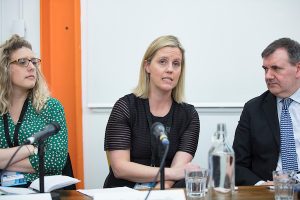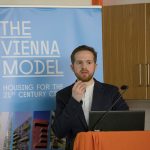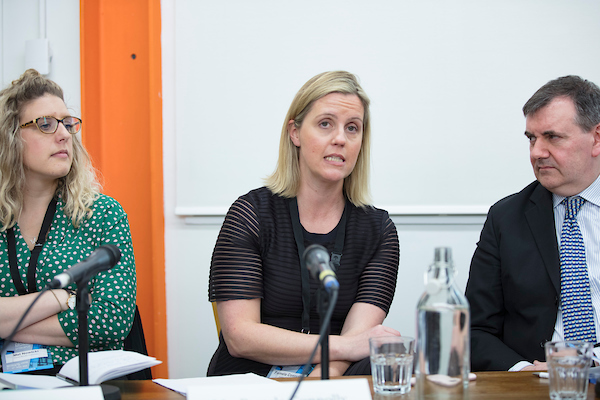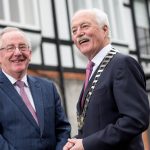Experts Explore Ballymun’s Potential as a European Leader in Housing
A discussion on Ballymun’s Housing, Community and Environment challenges and opportunities is taking place as part of the Vienna Model of Housing Exhibition
 Planning and housing experts are examining Ballymun’s potential as a European leader for innovative housing development, today, as part of the Vienna Model of Housing exhibition, taking place in Dublin until 25th April.
Planning and housing experts are examining Ballymun’s potential as a European leader for innovative housing development, today, as part of the Vienna Model of Housing exhibition, taking place in Dublin until 25th April.
A joint partnership between the Dublin City Council, the Housing Agency and City of Vienna, the exhibition seminars taking place in Ballymun are focused on the development of community and environmental strategies required to support a holistic approach for the provision of housing for all.
Previous planning within the Ballymun area indicates a lack of consideration for community development, with no main street or community focal point currently present. Dublin City Council’s local area plan (LAP) seeks to rectify this as part of Ballymun’s increasing share of new capital investment, including Rapid Build homes. Dublin City Council is currently developing 1,293 Rapid Build housing units, with sites either under construction, at tender assessment stage or under design assessment.
Poor planning and subsequent lack of maintenance has resulted in a misalignment between the physical environment and the community spirit felt throughout the local area.
Speakers also noted the many assets to Ballymun, including the introduction of Metro North, the Lidl development with accompanying 300-400 student accommodation units, cultural venues such as the Helix and the Axis, and proximity to Dublin City University. Future partnerships with DCU, in particular, offer the opportunity for developing construction courses with the use of new technology such as precision manufacturing and modular units.

Padraig Flynn, SOA Research
With potential to plan and deliver housing by the greater Ballymun community for the benefit of that community, planning and housing experts believe there is potential for the North Dublin suburb to develop a circular economy and drive innovative housing solutions. This includes a move away from owner-occupied housing towards the Viennese model which operates successfully in the Austrian capital.
Dr Dáithí Downey, Head of Housing Policy, Research and Development with Dublin City Council, said, “With forthcoming large scale investment under LAP, Ballymun has the opportunity to become a European leader of circular economy. The lessons available to us from the Viennese model can support this planning and achieve best practice strategies to serve the community of Ballymun. The assessment of needs and experience in building on the outskirts of urban areas are vital lessons to be implemented in the planning and development of Ballymun.”
Speakers also recognise the need for improved tenancy protection in such moves away from owner-occupied housing. Looking to Vienna’s experience, a proactive approach is recommended to intervene where issues arise, such as a difficulty to meet rental payments, before a crisis develops and the support of agencies is required.
The need for a holistic view of planning, developing and maintaining housing options within communities with recognition of their unique needs and environments, is echoed by the Transport Oriented Development project underway by the National Economic and Social Council (NESC). NESC is examining a case for a local transport scheme to advance the inadequate transport links throughout the area, which just recently saw an improved bus link to retailer IKEA instated. Similarly, the small number of transport links to the nearby Dublin Airport act as a restriction to a major local employer.
Dr Dáithí Downey continued, “The Vienna Model of Housing is the living proof that demonstrates how providing high quality, affordable housing is the basis for an inclusive, thriving, healthy society. We must recognise the social and economic return from housing investment and shift our expenditure on housing accordingly. Evidence presented to the European parliament confirms a €2 economic return for every €3 of housing investment in producing new housing and making better use of our existing housing stock. Housing investment, especially in social and affordable tenure options, works to create employment, develop new design and construction technologies, raise quality and help tackle climate change as well as bringing greater choice and improved affordability.”
Padraig Flynn, of SOA CoHousing, said, “SOA Research is delighted to participate in the pioneering Vienna Model seminar at the Rediscovery Centre in Ballymun. Given our mission to develop and promote self-organised, participatory, non-speculative and affordable approaches to the creation of housing in Ireland, it is exciting to see the implementation of a model which offers genuine long-term affordability, and challenges the notion of homes as speculative commodities.”
The Vienna Model of Housing is internationally regarded for its continued achievement of sustainable, high quality residential development using a cost-rental approach that in effect delivers housing for all. The Vienna Model of Housing Exhibition is open to the public and will be hosted in The Rediscovery Centre in Ballymun from 10th to 13th April and Richmond Barracks from 15th to 25th April.
In addition to the public exhibition which showcases the development of the Vienna Model of Housing, a number of screenings will take place of Frank Berry’s documentary, ‘Ballymun Lullaby’, which follows the early days of the Ballymun Music Programme for local schoolchildren. Children are also invited to take part in specifically designed workshops which explore engineering, building and the environment.
For more information: www.HousingModelDublin.ie
ENDS
Notes to the Editor
The Dublin Housing Observatory is an initiative of Dublin City Council. Underway since July 2018, the mission of the Dublin Housing Observatory is to is to make Dublin city an affordable and sustainable place to live by ensuring its housing and urban development strategy, policy and practice is underpinned by robust evidence and data.
The Housing Agency works with and supports, local authorities, housing bodies, and the Department of Housing, Planning and Local Government in the delivery of housing and housing services. The Housing Agency’s vision is to promote the building of sustainable communities.





